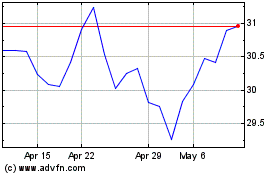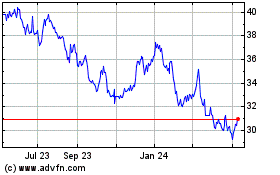Lilly, Roche Drugs Fail to Halt Inherited Form of Alzheimer's -- 2nd Update
February 10 2020 - 4:37PM
Dow Jones News
By Peter Loftus
In the latest failed attempt to help people with Alzheimer's, a
study found that experimental drugs from Eli Lilly & Co. and
Roche Holdings AG failed to help people with a rare, inherited form
of the dementia-causing disease.
The negative outcome continues a long streak of studies in which
experimental drugs fail to slow, halt or reverse the underlying
worsening of Alzheimer's disease. Current treatments for
Alzheimer's only temporarily alleviate symptoms but can't halt the
underlying disease.
Some drugmakers including Pfizer Inc. have exited from
Alzheimer's research, but much of the industry continues to push
ahead, given the growing burden of Alzheimer's. Last year, Biogen
Inc. reversed course and said it would pursue regulatory approval
for an experimental Alzheimer's drug despite previously finding
disappointing results in studies
Last year, there were 405 drugs being studied for Alzheimer's,
up from 381 in 2018 and ranking Alzheimer's behind several types of
cancer as top areas of research, according to a report from
research firm Informa UK Ltd.
The latest clinical trial, led by researchers at Washington
University School of Medicine in St. Louis and funded by the
National Institute on Aging, tested the drugs in people with
dominantly inherited Alzheimer's disease, which affects less than
1% of the Alzheimer's population.
People confirmed to have the genetic mutations are almost
certain to develop Alzheimer's, and it often starts in their 30s to
50s, younger than most Alzheimer's patients. If a person's parent
had the mutation, they have a 50-50 chance of inheriting it.
The trial, which started in 2012, tested the ability of the two
drugs to slow the worsening of cognitive function in people with
the mutations. Patients either had no symptoms or mild dementia at
the start of the trial. Some of the 194 participants were given
Lilly's solanezumab, others were given Roche's gantenerumab and a
third group received a placebo.
Neither drug was able to slow cognitive decline as measured by
several tests of thinking and memory, Washington University School
of Medicine said Monday.
Lilly's shares fell 0.6% and Roche's American depositary
receipts edged up 0.3% in Monday trading.
The Lilly and Roche drugs are designed to work by reducing a
sticky substance called beta amyloid that builds up in the brains
of Alzheimer's patients.
Lilly and Roche have previously tested their drugs in clinical
trials of patients with the more common form of Alzheimer's that
typically affects people 65 and older. Lilly's drug failed to
significantly help patients and Roche halted two studies of its
drug after concluding it wouldn't help.
Lilly said it won't pursue an application for regulatory
approval of solanezumab to treat dominantly inherited Alzheimer's.
Roche said it is unable to draw firm conclusions about the effect
of gantenerumab in inherited Alzheimer's.
Roche and Lilly said their experimental drugs continue to be
tested in other clinical trials. Many companies are testing higher
doses of their drugs, and at earlier stages of disease than in
previous failed trials of the same drugs.
Washington University School of Medicine researchers said they
plan to present more detailed analyses of the trial at medical
meetings in April and July.
Write to Peter Loftus at peter.loftus@wsj.com
(END) Dow Jones Newswires
February 10, 2020 16:22 ET (21:22 GMT)
Copyright (c) 2020 Dow Jones & Company, Inc.
Roche (QX) (USOTC:RHHBY)
Historical Stock Chart
From Mar 2024 to Apr 2024

Roche (QX) (USOTC:RHHBY)
Historical Stock Chart
From Apr 2023 to Apr 2024
